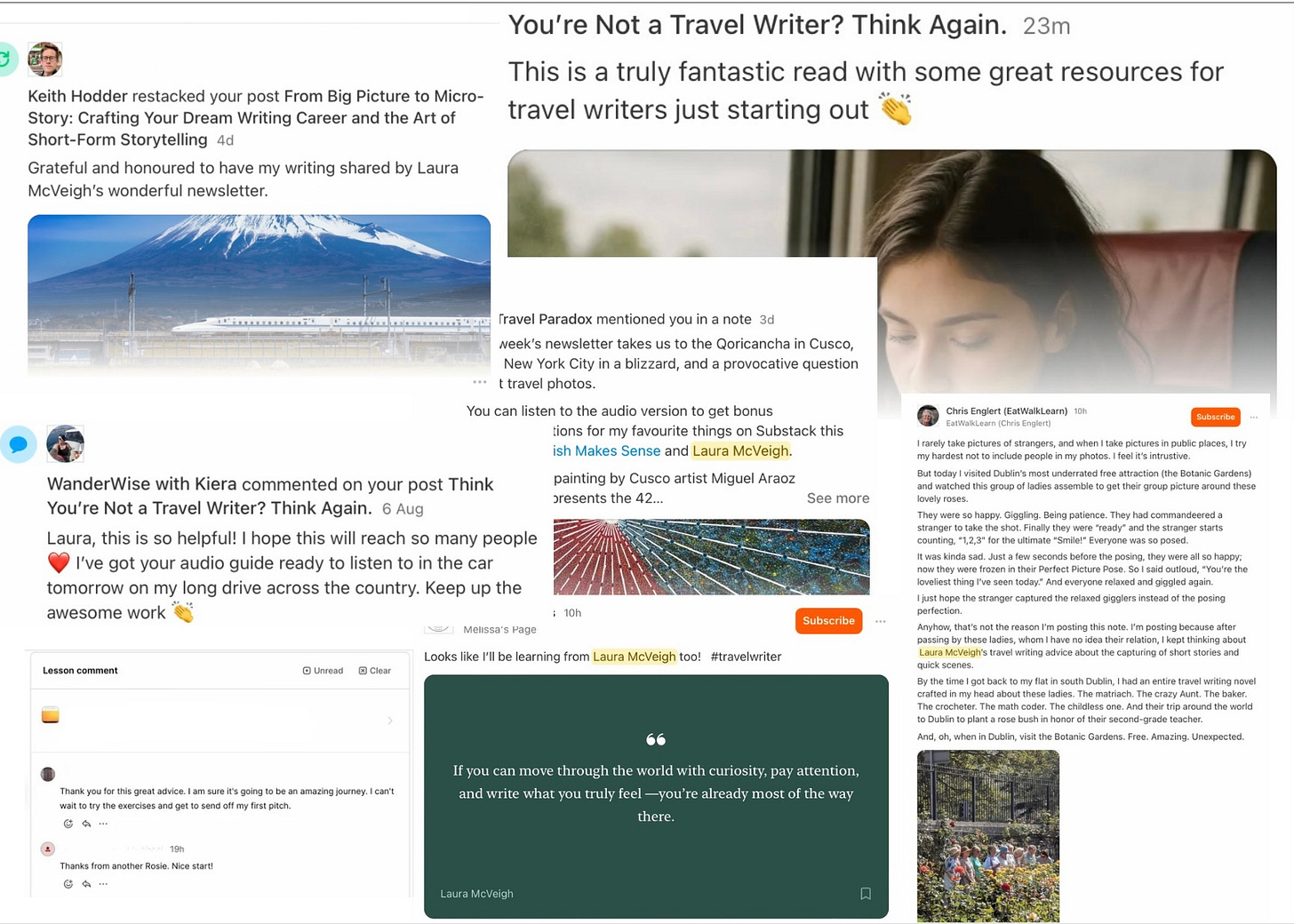Your Writing Blueprint Part II
Write Your Way Around the World: Helping You Thrive Through Story
If you’re new here, every week I share tips, insights and actionable ideas on writing, travel writing and green travel through the lens of a novelist and travel writer in three newsletters: Storycraft, Write Your Way Around the World and The Green Travel Guide.
Welcome, thanks for coming on the journey!
Last week, in Big Dreams, Tiny Tales we looked at how to write micro-stories (hook, story thread, transformation, closing), and I laid-out Part I of Your Writing Blueprint — a framework to help with structuring your writing path.
Here’s Part II, covering everything from goal-setting and planning, to dealing with rejection and how to build resilience, looking after yourself and building a daily writing practice without burnout, to tracking growth and progress as a writer.
I’m also sharing a deep dive into alternative storytelling models that can help you create greater resonance and depth in your writing, and have created a free Travel Writing Cliché Detox for you. Enjoy!
Your Writing Blueprint Part II
Welcome to Part II of Your Writing Blueprint! This week, we’re diving into the essential habits and mindset that support your travel writing practice.
Goal-Setting:
Start with the big picture—your “why”—then break it into actionable steps.
If you aren’t sure what it is you are specifically trying to achieve, it’s going to be hard to get results. So take the time to figure this out.
It’s important to really reflect — what kind of writing is your writing? Are you someone who is best suited to writing literary travel books, do you love practical service pieces, have you dozens of feature ideas in mind? Knowing yourself, and where your strengths and interests intersect with the marketplace is important in figuring out how to build your writing career. Be reflective, be intentional.
Action Step: Write down one big writing goal for the next 6 months. Then break it into 3 smaller, achievable steps you can start this week. Keep doing that every single week - action compounds. Focus on something you are genuinely motivated by. Don’t be afraid to dream big — but make sure the goal reflects you and what you want to do, the direction you want to take. Not what you think others expect!
Long-Term Planning:
Map out 6–12 months. Mark trips, deadlines, and key milestones. Your roadmap keeps you focused without feeling rigid. Make sure you use planning tools. These do not need to be complicated but you need good systems. Otherwise you will quickly lose track of which ideas you’ve pitched where and when, when follow-ups are due, when submission deadlines hit and it becomes difficult to manage your time. I’ve included some simple solutions for this in my Pitch Pack.
Action Step: Grab a calendar and schedule one month of smaller achievable writing goals (that led towards your 6 month goal and beyond), including pitch deadlines and personal deadlines.
Mindset:
Stay curious, patient, and be kind to yourself. Rejections happen—your mindset determines how you bounce back.
Action Step: Write down one recent rejection or setback, then list three things you learned from it.
How to Cope with Rejection
One of the most important things to understand with writing — whether you’re writing fiction and seeking an agent/publisher or writing articles and seeking to place them with publications and media outlets — is rejection is going to happen. Most likely, over and over again. Ask any famous writer. This is just how it works.
You need to learn that someone passing on your idea/article/book is not personal. There could be a million and one reasons why — the agent already has a full client list, the publisher just took on a book on the same topic, the magazine isn’t commissioning right now because of budget cuts. You get the picture.
You cannot control any of that. What you can control is how you react.
Understand that you have value, your work has value, and if you persist and keep working on your craft, sooner or later a door will open for you.
You always have the choice — do you want to be the ‘writer’ who sits around saying, ‘it’s hopeless, no-one cares about my writing,’ or do you simply want to be the writer?
Writers do not quit. It’s hard-wired. When you shake off worrying about how others may react, you free up time and energy to really write. Take ‘no’ as simple redirection and keep going. Learn what you can from feedback - is there a common theme to responses? If so, that might be an area you need to look at — be open. Look for what is helpful for your growth as a writer, while holding on to your self-belief. Work on your craft. Persist.
Once that door does open, you’ll be ready to step through it, because you will have learnt to believe in your voice and your writing.
Self-Care:
Your mind and body are your creative tools. They’re also YOU. And you need to look after yourself.
Prioritise sleep, exercise, get outdoors for walks and sunlight, make time to be offline and out living life.
Action Step: Schedule one 30-minute break today just for yourself—walk, meditate, or stretch. Some of the best writing is done when washing dishes, hiking, gardening. It’s found in quiet moments. Make time for those moments.
Writing Day-to-Day:
How you show up to write can help or hinder your writing practice. First of all, there’s no one right answer on this. Some people love to write in bursts in the middle of the night. Others religiously write from 9am - 1pm Monday to Friday. Many fit writing around busy jobs. Some folk prefer to write in a café with background noise and life, others need a quiet room with no distractions. The key thing is to figure out what works for you and do that.
I have a couple of writing desks. One houses a TBR stack. The other I sometimes will sit down to write at, but more over than not I’ll write at the kitchen table, or outside with a notebook, even in the car. The main thing is — do you find yourself writing?
Remember:
Consistency beats inspiration.
Set a routine, batch tasks, and stay flexible.
Even small daily habits compound over time.
Action Step: Decide on a daily or weekly writing slot and protect it like any important appointment. Set the alarm, block out the time. Hang up the ‘Do not Disturb’ sign.
Growth:
Often with writing you may feel scattered, or like you’re not getting forward. Maybe you’ve written ten pitches and none landed. Perhaps you’re working on a memoir and you’re stuck on Chapter Four. Whatever your challenge in the moment — by keeping a record of your wins, small and big, you have something to reflect back on in those moments when it’s all feeling difficult.
We focus often on the future, and where we want to go, forgetting how far we’ve already travelled. Have you carved out time to write? That’s a win. Have you created your goals for the year ahead? Another win. Did you sit down today and write, even if it was only a few hundred words? You’re still winning.
Track wins, reflect on what works, and adjust. Celebrate successes and learn from setbacks—they’re all part of your journey.
Action Step: At the end of the week, jot down at least one win and one lesson learned from your writing practice. Do this every week — and you’ll soon start to feel the progress you are making.
I hope you’ve found this helpful. For writers—fiction or travel—I have just a few coaching spots open: one for September and two for October/November. I keep them limited so I can give each writer the time and focus they deserve. If you’d like to learn more, DM me “Coaching” to chat or join the waitlist.
Thank You!
Just sharing a handful of the beautiful, encouraging messages from last week. Thanks so much to everyone taking the time to read the newsletters, signing up for resources, and sharing your own writing and travels — I appreciate you. Shout out here to a few folk:
Thank you shout-outs this week include: WanderWise, Rosie Mitchell, Chris, Melissa’s Page, Keith Hodder, The Travel Paradox, and Marc Hall. All exploring (ideas and places) and writing interesting things!
Beyond ‘The Hero’s Journey’ — Models for How we Shape Stories
Often we can get stuck in patterns of thinking about our writing — and that includes how we tell stories.
But the Hero’s Journey isn’t the only game in storytelling town.
In this week’s StoryCraft (on Sundays I write about the art of Storytelling), I delved into different archetypal models for storytelling from around the world. These models don’t just apply to writing fiction or film scripts — you can use the ideas to help shape your travel writing too. From nested stories, to the spiral, to lessons from Japanese theatre, to ensemble voices, find more here in Do We Still Need Heroes?
If you’re new here, here’s a good overview post: Think You’re Not a Travel Writer? Think Again. It has a link to a free audio course on getting started as a travel writer — if that’s of interest you can access it through the link in post.
This week I also shared a new free resource: 50 Travel Writing Clichés Detox - clichés and alternative phrasing.
I post three weekly newsletters - Storycraft (on creativity and storytelling), Write Your Way Around The World (on travel writing and creating a portfolio writing career you love), and The Green Travel Guide (mindful travel, slow travel stories, destination guides).
What You’ll Learn Here — Every Tuesday
Every Tuesday in Write Your Way Around The World, I share:
Practical guidance on writing craft, pitching, editing, and freelancing
Encouragement for staying resilient and consistent as a writer
Real talk about money, mindset, rejection, and career-building
Inspiration from great travel writing and emerging trends
Resources to help you go further, faster
Future weeks will dig deep into how to make a living doing this, how to get published, how to find your niche/s or not (just write what you love), how to turn your travel notes into paid work. Let me know which topics you would like to know more about.
All the newsletters can be accessed with a free subscription.
If you enjoyed this week’s post, please share with your writer friends, comment and if you want to grab that last coaching spot for September send me a DM - I read all the messages. ❤️
Until next week, happy writing,
Laura
Laura McVeigh
Author, Travel Writer, Storytelling Coach
lauramcveigh.com | lauramcveightravel.com | travel-writing.com | greentravelguides.world
Laura McVeigh is an international bestselling Northern Irish novelist and travel writer. Her work is widely translated. She has authored books for Lonely Planet, DK Travel, bylines in the Irish Times, Irish Independent, featured by the BBC, Newsweek, New Internationalist & many more. A former CEO she has worked with writers from 145 countries. She is founder of Travel-Writing.Com and Green Travel Guides. Laura writes on storytelling, travel writing and mindful travel on Substack.






This article is really great, Laura. Heaps of good tips, thank you!!!